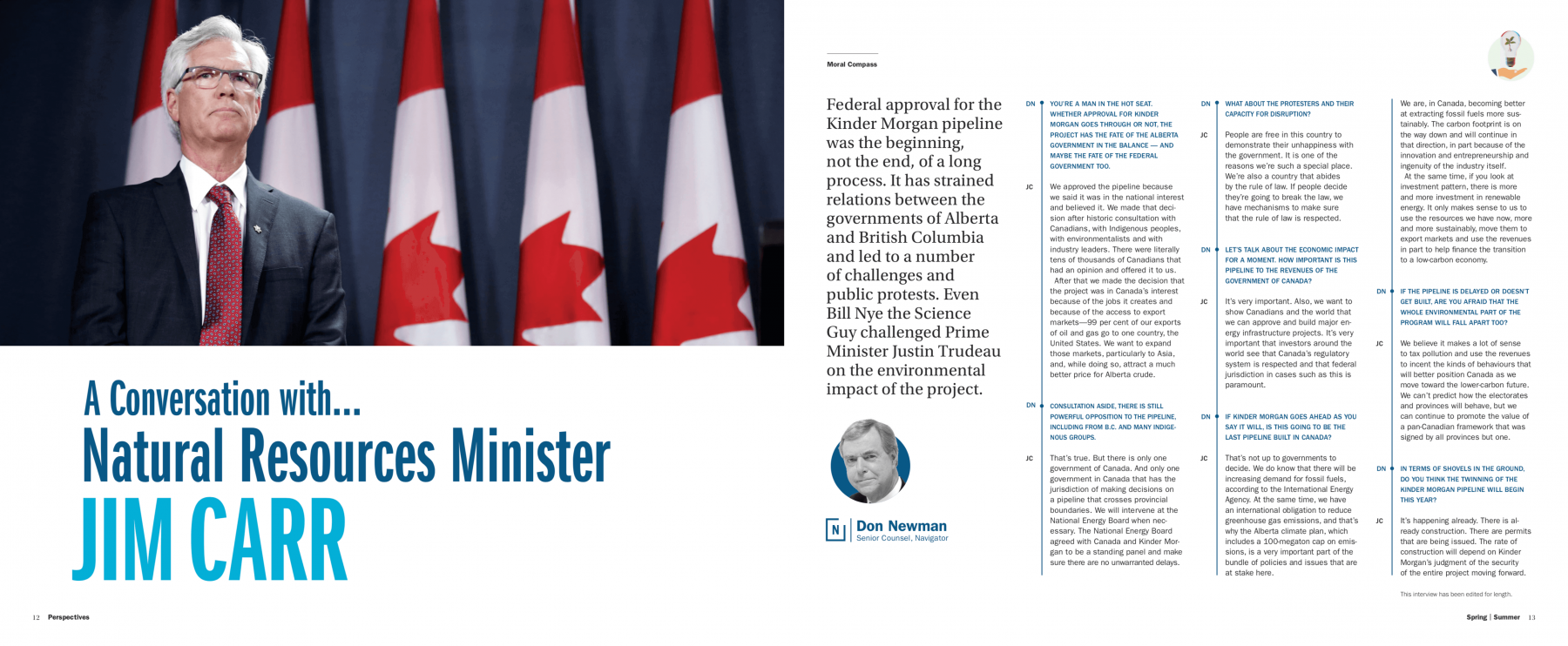- CEOCap
- Jaime Watt’s Debut Bestseller ‘What I Wish I Said’
- Media Training
- The Push Back
- Internship program
- Update Your Profile
- Homepage
- It’s time for a change
- It’s time for a change
- Kio
- Ottawa
- Art at Navigator
- Navigator Limited Ontario Accessibility Policy
- Virtual Retreat 2020 Closing Remarks
- COVID-19 Resources
- Offices
- Navigator Sight: COVID-19 Monitor
- Navigator Sight: COVID-19 Monitor – Archive
- Privacy Policy
- Research Privacy Policy
- Canadian Centre for the Purpose of the Corporation
- Chairman’s desk
- ELXN44
- Media
- Perspectives
- Podcasts
- Subscribe
- Crisis
- Reputation
- Government relations
- Public affairs campaigns
- Capital markets
- Discover
- studio
- How we win
- What we believe
- Who we are
- Careers
- Newsroom
- AI
- Empower by Navigator
- Environmental responsibility

Federal approval for the Kinder Morgan pipeline was the beginning, not the end, of a long process. It has strained relations between the governments of Alberta and British Columbia and led to a number of challenges and public protests. Even Bill Nye the Science Guy challenged Prime Minister Justin Trudeau on the environmental impact of the project.
You’re a man in the hot seat. Whether approval for Kinder Morgan goes through or not, the project has the fate of the Alberta government in the balance — and maybe the fate of the federal government too.
We approved the pipeline because we said it was in the national interest and believed it. We made that decision after historic consultation with Canadians, with Indigenous peoples, with environmentalists and with industry leaders. There were literally tens of thousands of Canadians that had an opinion and offered it to us.
After that we made the decision that the project was in Canada’s interest because of the jobs it creates and because of the access to export markets—99 per cent of our exports of oil and gas go to one country, the United States. We want to expand those markets, particularly to Asia, and, while doing so, attract a much better price for Alberta crude.
Consultation aside, there is still powerful opposition to the pipeline, including from B.C. and many Indigenous groups.
That’s true. But there is only one government of Canada. And only one government in Canada that has the jurisdiction of making decisions on a pipeline that crosses provincial boundaries. We will intervene at the National Energy Board when necessary. The National Energy Board agreed with Canada and Kinder Morgan to be a standing panel and make sure there are no unwarranted delays.
What about the protesters and their capacity for disruption?
People are free in this country to demonstrate their unhappiness with the government. It is one of the reasons we’re such a special place. We’re also a country that abides by the rule of law. If people decide they’re going to break the law, we have mechanisms to make sure that the rule of law is respected.
Let’s talk about the economic impact for a moment. How important is this pipeline to the revenues of the government of Canada?
It’s very important. Also, we want to show Canadians and the world that we can approve and build major energy infrastructure projects. It’s very important that investors around the world see that Canada’s regulatory system is respected and that federal jurisdiction in cases such as this is paramount.
If Kinder Morgan goes ahead as you say it will, is this going to be the last pipeline built in Canada?
That’s not up to governments to decide. We do know that there will be increasing demand for fossil fuels, according to the International Energy Agency. At the same time, we have an international obligation to reduce greenhouse gas emissions, and that’s why the Alberta climate plan, which includes a 100-megaton cap on emissions, is a very important part of the bundle of policies and issues that are at stake here.
We are, in Canada, becoming better at extracting fossil fuels more sustainably. The carbon footprint is on the way down and will continue in that direction, in part because of the innovation and entrepreneurship and ingenuity of the industry itself.
At the same time, if you look at investment pattern, there is more and more investment in renewable energy. It only makes sense to us to use the resources we have now, more and more sustainably, move them to export markets and use the revenues in part to help finance the transition to a low-carbon economy.
If the pipeline is delayed or doesn’t get built, are you afraid that the whole environmental part of the program will fall apart too?
We believe it makes a lot of sense to tax pollution and use the revenues to incent the kinds of behaviours that will better position Canada as we move toward the lower-carbon future. We can’t predict how the electorates and provinces will behave, but we can continue to promote the value of a pan-Canadian framework that was signed by all provinces but one.
In terms of shovels in the ground, do you think the twinning of the Kinder Morgan pipeline will begin this year?
It’s happening already. There is already construction. There are permits that are being issued. The rate of construction will depend on Kinder Morgan’s judgment of the security of the entire project moving forward.
This interview has been edited for length.
